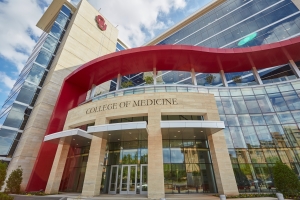 It would be very difficult, if not impossible, to think of one person or business that has not been impacted in some way by COVID-19, and the University of Oklahoma College of Medicine is certainly no exception.
It would be very difficult, if not impossible, to think of one person or business that has not been impacted in some way by COVID-19, and the University of Oklahoma College of Medicine is certainly no exception.
The College of Medicine is the largest component of the OU Health Sciences Center and is at the center of OU Medicine, providing education, research and patient care.
“Throughout the course of this pandemic, OU College of Medicine’s primary goals are to maintain adequate levels of staffing for our healthcare workforce, and to ensure the safety of those providers so they can continue providing the highest-quality care for our patients,” said John Zubialde, M.D., executive dean, OU College of Medicine.
In non-COVID times, medical residents and fellows are typically the first to see patients in OU Medicine hospitals and clinics. While that has not changed in the face of COVID-19, many of these providers, including some faculty physicians, had to be reassigned from their primary specialty to other areas where physicians were most needed. Additionally, many college alumni and community physicians pledged to help should the situation become more than can be handled by existing providers.
“Each of these physicians have been taking on an extra layer of risk conducting these activities,” Zubialde said. “These doctors have stepped up and met challenges, despite the potential risks, and are demonstrating what it means to be true professionals in a crisis.”
This spring, medical student education was significantly affected by COVID-19. Preclinical courses for first- and second-year medical students were delivered remotely through video-based lectures. On March 19, coinciding with the vast majority of medical schools across the country, the OU College of Medicine removed all third- and fourth-year medical students from their clinical rotations. Some of that education continued through virtual clerkships, while other elements of clerkships picked back up after students were able to resume contact with patients.
“While medical students and residents may have missed out on some of the traditional educational activities during this pandemic, they have gained an unparalleled perspective on the important role of health professionals and insight into how they can carry that into the future,” said Zubialde.
Fourth-year medical students in the class of 2020 celebrated their awards ceremonies and commencement virtually this year, another unexpected result of COVID-19 restrictions on large gatherings.
For the research mission, OU College of Medicine researchers have been applying their expertise to a variety of projects that seek to unravel the mechanisms of COVID-19. William Hildebrand, Ph.D., George L. Cross Research Professor in the Department of Microbiology and Immunology, launched a research collaboration with Pure MHC, an innovative biotechnology company that was commercialized from his research, to work toward the development of a vaccine. Many other researchers are developing and submitting projects that will investigate various aspects of COVID-19 and the way it damages the body.
“This is undoubtedly one of the most significant medical crises that we will see in our lifetimes and in our careers in medicine,” Zubialde said. “I am proud to be leading a college that has never wavered in its responsibilities, and to be working within an enterprise that, day in and day out, strives to reduce suffering and provide healing.”